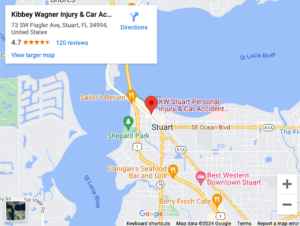
Negligence is an important concept in the area of personal injury law. In layman’s terms, negligence is a party’s failure to use reasonable care. Reasonable care is the degree of care that a reasonably prudent person would use under similar circumstances.
Negligence may consist either of failing to do something that a reasonable person would do under similar circumstances or doing something that a reasonable person would not do under similar circumstances. Below, we explain the legal concept of negligence.
Negligence and Personal Injury Law

Although there are some exceptions, most personal injury cases involve allegations of negligence. In most cases, negligence is the primary legal basis for a personal injury claim, and it plays a key role in determining whether an injury victim will be able to obtain compensation and the amount they may receive.
In addition, negligence applies regardless of whether the at-fault person intended for the damage to occur. For example, although personal injury cases are sometimes the result of intentional behavior, such as civil battery, most involve the unintentional consequences of irresponsible behavior, such as speeding while driving.
What Are the Elements of Negligence?
Negligence in a Florida personal injury lawsuit consists of four elements: duty, breach, causation, and damages. A plaintiff in a personal injury lawsuit must prove each of these elements to recover compensation from the at-fault party.
Below is an explanation of each of these negligence elements.
Duty of Care
A plaintiff’s first step in succeeding in a personal injury lawsuit under a theory of negligence is proving that the other party owed them a duty of care.
Duty is a person or entity’s legal obligation to act in a certain way. For example, when operating a car, motorcycle, or another motor vehicle, the driver has a legal duty to operate the vehicle in a manner that is consistent with the laws and rules of the road. In other words, the applicable driving laws impose this duty on the driver.
Breach of Duty
After establishing that the defendant owed the plaintiff a duty of care, the plaintiff must show that the defendant breached this duty.
A speed limit, for example, imposes a duty on drivers to operate their vehicles to drive at or under a certain speed. When a driver breaks the speed limit, they breach their duty to other drivers.
In addition, operating a vehicle in other unsafe ways, such as running red lights and stop signs, swerving in and out of traffic, and otherwise operating a vehicle in a dangerous fashion, are all breaches of duty.
Causation
Simply demonstrating that a defendant breached their duty to the plaintiff in a lawsuit is not enough to succeed in a negligence action. Instead, the plaintiff in a personal injury lawsuit must also prove causation.
Causation is the connection between the defendant’s breach of duty and the harm suffered by the plaintiff. In other words, a defendant’s breach of duty must have directly caused the plaintiff some type of harm.
For example, if a defendant’s speeding is unrelated to a plaintiff skidding off the road, there is no causation. On the other hand, if a defendant cuts off a plaintiff and causes a car accident, there is a direct link between the defendant’s breach of duty to drive safely and the plaintiff’s accident.
Damages
Finally, for a plaintiff to succeed in a negligence action, they must have suffered damages as a result of the defendant’s actions or inactions.
Damages are measurable harm caused by a defendant’s breach of duty. Damages usually take the form of physical damages to the victim, such as a broken bone or other types of injury. However, there are also special types of damages specifically designed to address the mental effects on a plaintiff stemming from a defendant’s behavior, such as mental anguish and pain and suffering.
Contact a Florida Personal Injury Attorney For Help Proving Negligence
If you’ve been injured in an accident in the state of Florida, you need an experienced personal injury lawyer on your side. A personal injury lawyer can help you recover the compensation you’re entitled to by gathering evidence proving the elements of negligence, standing up to formidable opponents, and negotiating on your behalf.
Contact our personal injury law firm Kibbey Wagner Injury & Car Accident Lawyers Stuart by dialing (772) 444-7000 and schedule a free initial consultation.

